Quincy Josiah
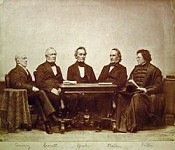
Josiah Quincy III (February 4, 1772 – July 1, 1864 and pronounced /ˈkwɪnzi/) was a U.S. educator and political figure. He was a member of the U.S. House of Representatives (1805–1813), Mayor of Boston (1823–1828), and President of Harvard University (1829–1845). The historic Quincy Market in downtown Boston is named in his honor. Quincy, the son of Josiah Quincy II and Abigail Phillips,[4] was born in Boston, on that part of Washington Street that was then known as Marlborough Street.[5] His father had traveled to England in 1774, partly for his health but mainly as an agent of the patriot cause to with the friends of the colonists in London. Josiah Quincy II died off of the coast of Gloucester on the 26th of April, 1776. His son, young Josiah, was not yet three years old.[6] He entered Phillips Academy, Andover, when it opened in 1778, and graduated from Harvard in 1790. After his graduation from Harvard he studied law for three years under the tutorship of William Tudor.[7] Quincy was admitted to the bar in 1793, but was never a prominent advocate. In 1797 Quincy married Eliza Susan Morton of New York.[8] In 1798 Quincy was appointed Boston Town Orator by the Board of Selectmen, and in 1800 he was elected to the School Committee.[9] Quincy became a leader of the Federalist party in Massachusetts, was an unsuccessful candidate for the United States House of Representatives in 1800, and served in the Massachusetts Senate in 1804–5. From 1805 to 1813 he was a member of the United States House of Representatives where he was one of the small Federalist minority. He attempted to secure the exemption of fishing vessels from the Embargo Act, urged the strengthening of the United States Navy, and vigorously opposed the admittance of Louisiana as a state in 1811. In this last matter he stated as his "deliberate opinion, that if this bill passes, the bonds of this Union are virtually dissolved; that the States that compose it are free from their moral obligations; and that, as it will be the right of all, so it will be the duty of some, to prepare definitely for a separation, amicably if they can, violently if they must."[10] This was probably the first assertion of the right of secession on the floor of Congress. Quincy left Congress because he saw that the Federalist opposition was useless. After leaving Congress, Quincy was a member of the Massachusetts Senate until 1820. In 1821–22 he was a member and speaker of the Massachusetts House of Representatives. Quincy resigned from the legislature to become judge of the municipal court of Boston. On April 8, 1822 Quincy was a candidate for Mayor in Boston's first election under a city charter.[11] After the first ballot the votes of this first election were split between Quincy and Harrison Gray Otis. Because neither had a majority of the electorate neither was elected. After the first vote resulted in neither man receiving a majority of the votes they both withdrew their candidacies and John Phillips was elected Boston's first mayor.[12] In 1823 Quincy was elected as the second mayor of Boston, he would serve 6 one year terms from 1823 to 1828.[13] During his terms as mayor Quincy Market was built, the fire and police departments were reorganized, and the city's care of the poor was systematized. From 1829 to 1845 he was President of Harvard University, of which he had been an overseer since 1810, when the board was reorganized. He has been called "the great organizer of the university." He gave an elective (or "voluntary") system an elaborate trial; introduced a system of marking (on the scale of 8) on which college rank and honors, formerly rather carelessly assigned, were based; first used courts of law to punish students who destroyed or damaged college property; and helped to reform the finances of the university. During his term Dane Hall (for law) was dedicated, Gore Hall was built, and the Astronomical Observatory was equipped. His last years were spent principally on his farm in Quincy, Massachusetts, where he died on July 1, 1864.[14][15] He was the father of seven children: Eliza Susan Quincy, Josiah Quincy, Jr., Abigail Phillips Quincy, Maria Sophia Quincy, Margaret Morton Quincy, Edmund Quincy, and Anna Cabot Lowell Quincy. "Quincy, Josiah". Encyclopædia Britannica (11th ed.). 1911.
do you like this author?
What readers are saying
What do you think? Write your own comment on this book!
write a commentWhat readers are saying
What do you think? Write your own comment on this author!
write a commentBook list

moderate houses for modern means an argument for cheap trains as essential to
Series:
Unknown
Year:
Unknown
Raiting:
4/5
Show more
add to favoritesadd In favorites
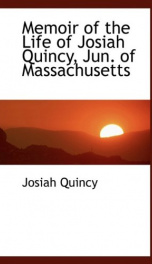
memoir of the life of josiah quincy jun of massachusetts
Series:
Unknown
Year:
Unknown
Raiting:
4/5
Purchase of this book includes free trial access to www.million-books.com where you can read more than a million books for free. This is an OCR edition with typos. Excerpt from book: This Edmund Quincy left two sons, Edmund and Josiah. Edmund, the eldest, was born in Braintree, in 1703, was educated at Harvard College, and received his degree in 1722. He was many years a merchant in Boston. Afterwards he resided on his paternal estate in Braintree ; was author of " A Treatise on Hemp Husbandry," published in 1765, and died an acting magistrate of the county of Suffolk, in July 1788, at the age of eighty-five. Josiah, the youngest son of Edmund Quincy, was born in Braintree, iu 1709. He was graduated at Harvard College, in 1728, and entered into business as a merchant in Boston. In 1737, he accompanied his father to England, passed several years in Europe at different periods of his life, and finally returned to America in 1749. He was appointed in 1755, by Governor Shirley, joint commissioner with Thomas Pownall, afterwards Governor Pownall, to negotiate with the colonies of Pennsylvania and New York, for assistance in erecting a frontier barrier against the French, at Ticouderoga. In this mission he availed himself of the influence of Dr Franklin, and was successful. The particular circumstances of this negotia- See Appendix. nrc related in the Memoirs of that great man, written by himself. i ....- Josiah Quincy retired in 1756 from business, and resided in Braintree, on his portion of his paternal estate, until his death, in 1784. His latter years were embittered by the loss of his youngest son, the subject of these memoirs, with whose zeal in the cause of American liberty, he cordially co-operated ; and whose reputation for genius, and rising promise of future usefulness and distinction, he had cherished as the hope and solace of his declining years. He was in friendship and correspondence with Washington, Adams, Franklin, Bowdoin, and other d... --This text refers to an alternate Paperback edition.
Show more
add to favoritesadd In favorites

figures of the past from the leaves of old journals volume 2
Series:
Unknown
Year:
Unknown
Raiting:
4/5
Show more
add to favoritesadd In favorites
Book list

moderate houses for modern means an argument for cheap trains as essential to
Series:
Unknown
Year:
Unknown
Raiting:
4/5
Show more
add to favoritesadd In favorites

memoir of the life of josiah quincy jun of massachusetts
Series:
Unknown
Year:
Unknown
Raiting:
4/5
Purchase of this book includes free trial access to www.million-books.com where you can read more than a million books for free. This is an OCR edition with typos. Excerpt from book: This Edmund Quincy left two sons, Edmund and Josiah. Edmund, the eldest, was born in Braintree, in 1703, was educated at Harvard College, and received his degree in 1722. He was many years a merchant in Boston. Afterwards he resided on his paternal estate in Braintree ; was author of " A Treatise on Hemp Husbandry," published in 1765, and died an acting magistrate of the county of Suffolk, in July 1788, at the age of eighty-five. Josiah, the youngest son of Edmund Quincy, was born in Braintree, iu 1709. He was graduated at Harvard College, in 1728, and entered into business as a merchant in Boston. In 1737, he accompanied his father to England, passed several years in Europe at different periods of his life, and finally returned to America in 1749. He was appointed in 1755, by Governor Shirley, joint commissioner with Thomas Pownall, afterwards Governor Pownall, to negotiate with the colonies of Pennsylvania and New York, for assistance in erecting a frontier barrier against the French, at Ticouderoga. In this mission he availed himself of the influence of Dr Franklin, and was successful. The particular circumstances of this negotia- See Appendix. nrc related in the Memoirs of that great man, written by himself. i ....- Josiah Quincy retired in 1756 from business, and resided in Braintree, on his portion of his paternal estate, until his death, in 1784. His latter years were embittered by the loss of his youngest son, the subject of these memoirs, with whose zeal in the cause of American liberty, he cordially co-operated ; and whose reputation for genius, and rising promise of future usefulness and distinction, he had cherished as the hope and solace of his declining years. He was in friendship and correspondence with Washington, Adams, Franklin, Bowdoin, and other d... --This text refers to an alternate Paperback edition.
Show more
add to favoritesadd In favorites

figures of the past from the leaves of old journals volume 2
Series:
Unknown
Year:
Unknown
Raiting:
4/5
Show more
add to favoritesadd In favorites

figures of the past from the leaves of old journals volume 1
Series:
Unknown
Year:
Unknown
Raiting:
5/5
Show more
add to favoritesadd In favorites
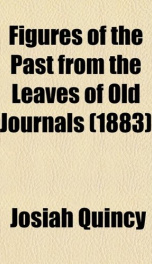
figures of the past from the leaves of old journals
Series:
Unknown
Year:
Unknown
Raiting:
4/5
Figures of the past from the Leaves of Old Journals is a wonderful autobiographical story which belongs to the pen of Josiah Quincy. The author describes the events that happened during his life between 1772-1864. The story is very bright and the characters are charming and it is wonderful to realize that they were real people. The book is definitely recommended to all readers who are interested in the life of wealthy people of the 18th century and who want to dive into the society of that time.
Show more
add to favoritesadd In favorites
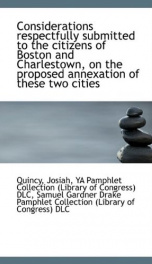
considerations respectfully submitted to the citizens of boston and charlestown
Series:
Unknown
Year:
Unknown
Raiting:
5/5
Show more
add to favoritesadd In favorites

buddhist birth stories or jataka tales the oldest span classsearchterm
Series:
Unknown
Year:
Unknown
Raiting:
5/5
Show more
add to favoritesadd In favorites

an answer to the questions why are you a federalist and why shall you vote for
Series:
Unknown
Year:
Unknown
Raiting:
5/5
Show more
add to favoritesadd In favorites
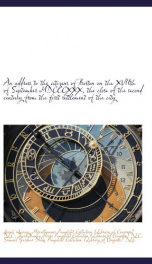
an address to the citizens of boston on the xviith of september mdcccxxx the
Series:
Unknown
Year:
Unknown
Raiting:
4/5
Show more
add to favoritesadd In favorites

an address commemorative of the organization of city government in boston may 1
Series:
Unknown
Year:
Unknown
Raiting:
5/5
Show more
add to favoritesadd In favorites

an address commemorative of the organization of city government in boston
Series:
Unknown
Year:
Unknown
Raiting:
4/5
Show more
add to favoritesadd In favorites
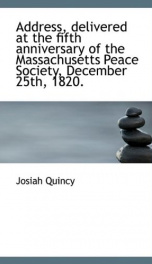
address delivered at the fifth anniversary of the massachusetts peace society
Series:
Unknown
Year:
Unknown
Raiting:
4/5
Show more
add to favoritesadd In favorites
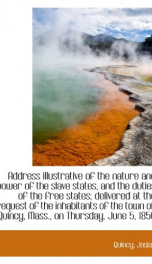
address illustrative of the nature and power of the slave states and the duties
Series:
Unknown
Year:
Unknown
Raiting:
5/5
Delivered At The Request Of The Inhabitants Of The Town Of Quincy, Massachusetts, On Thursday, June 5, 1856. --This text refers to an alternate Paperback edition.
Show more
add to favoritesadd In favorites
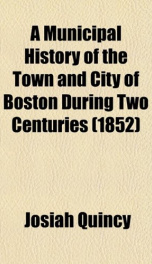
a municipal history of the town and city of boston during two centuries
Series:
Unknown
Year:
Unknown
Raiting:
4/5
Purchase of this book includes free trial access to www.million-books.com where you can read more than a million books for free. This is an OCR edition with typos. Excerpt from book: CHAPTER III. TOWN GOVERNMENT. 1821-1822. The Almshouse removed from Beacon Street to Leverctt StreetOverseers of the Poor remonstrate on its Condition Proceedings of the Legislature of Massachusetts on the Subject of Pauperism Erection of a House of Industry authorized by the Inhabitants of Boston Noble Conduct of Samuel Brown His CharacterHouse of Industry erected Act of Incorporation of the City obtained and accepted John Phillips chosen Mayor. The defects and insufficiency of the Boston Almshouse became a subject of earnest complaint soon after Massachusetts attained the rant of an independent state. By a report of a committee of the town in the year 1790, it appears that it was destitute of a separate hospital or infirmary; that persons of every age and character were lodged under the same roof; the sick disturbed by the noise of the healthy; and the aged and infirm endangered and annoyed by the diseased and profligate. All attempts to change the locality of the institution were unsuccessful until the year 1801, when an almshouse was erected in Leverett Street, and that in Beacon Street discontinued and the land sold. The new building was of enlarged dimensions and accommodations, but its interior arrangements did not permit the separation of age and misfortune from vice and vagrancy. In 1802, one year after the removal of the almshouse to Leverett Street, the importance of erecting another building, for a house of correction, was forcibly urged on the town by a committee of the selectmen, of which Charles Bulfinch was chairman, accompanied by estimates of the probable cost. Its immediate erection was, however, postponed, on account of the pecuniary exigencies of the town. No further proceedings occurred until 1812, when the Overseers of the Poor themse...
Show more
add to favoritesadd In favorites

a municipal history of the town and city of boston during two centuries from s
Series:
Unknown
Year:
Unknown
Raiting:
4/5
Show more
add to favoritesadd In favorites

a catalogue of books and pamphlets relating to the american civil war 1861 5 and
Series:
Unknown
Year:
Unknown
Raiting:
5/5
Show more
add to favoritesadd In favorites
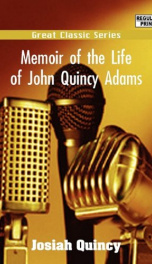
Memoir of the Life of John Quincy Adams.
Series:
Unknown
Year:
Unknown
Raiting:
1/5
The ensuing Memoir comprises the most important events in the life of a statesman second to none of his contemporaries in laborious and faithful devotion to the service of his country. The light attempted to be thrown on his course has been derived from personal acquaintance, from his public works, and from authentic unpublished materials. The chief endeavor has been to render him the expositor of his own motives, principles, and character, without fear or favor,--in the spirit neither of criticism or eulogy.
Show more
add to favoritesadd In favorites
What readers are saying
What do you think? Write your own comment on this author!
write a commentif you like Quincy Josiah try:
readers also enjoyed
What readers are saying
What do you think? Write your own comment on this author!
write a commentGenre
if you like Quincy Josiah try:
readers also enjoyed
Do you want to read a book that interests you? It’s EASY!
Create an account and send a request for reading to other users on the Webpage of the book!

